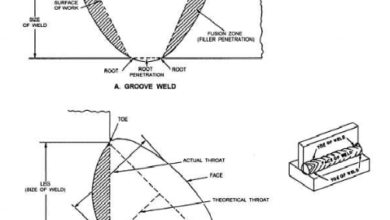What are the Different Branches of Mechanical Engineering?
Mechanical engineering is one of the widest ends of fundamental engineering. There are different fundamental engineering areas, such as chemical engineering and civil engineering. These engineering areas are one of the oldest engineering branches, and also, you can be one of them. If you are curious about the different branches of mechanical engineering, in particular, you are at the right place to learn it. Have the question of what are the branches of mechanical engineering on your head? Take a look here.
Different Branches of Mechanical Engineering
Mechanical engineering is a very broad area that has different kinds of branches and specialties. You can specialize in these different branches if you are studying mechanical engineering. So, it is very important to choose the branch that you want to work in. And you need to be sure that there are lots of kinds of advantages and possibilities in the different kinds of branches of mechanical engineering.
Manufacturing

Maybe manufacturing or manufacturing engineering is the biggest or the widest branch that you can take apart. You can see different kinds of factories that are manufacturing different kinds of products, goods, or something. And you can be sure that there are manufacturing engineers that deal with these manufacturing processes. If you want to be sure that you will be hard after your graduation, it is advisable to increase your knowledge and skill set in manufacturing. Also, manufacturing itself has different kinds of branches, such as the metal sector, plastic sector, etc. But in your bachelor’s degree or your engineering education, it is very important to choose a branch such as manufacturing and choose the sub-branch after your graduation according to the place that you want to work.
Another advantage of manufacturing is that promotional advantages are much higher than the other branches. Why? The reason is very simple. This is because you will probably take part in a specific production line, and you will need to deal with the people who are working in that specific production line. You need to manage these people, adjust the working schedules, etc. It requires very good management abilities. If you are good in managing abilities and managing people’s tasks and work, you can be a very good candidate to promote to higher positions and manage people inside your team.
Automotive
Also, automotive is a very popular branch of mechanical engineering. In the automotive sector, you can take part in different kinds of biggest companies, such as Mercedes, BMW, etc. It is popular because lots of people are in love with cars. Dealing with cars and the subsystems of the car’s engines and powertrain systems will be much more satisfying for these people.
Probably, you will face very big rivalry in the automotive sector. The reason is very straightforward: lots of people are choosing the automotive industry.
But you can increase your knowledge and skill set about automotive systems, such as brake systems, engine systems, and other kinds of interior or exterior systems, to take part in specific positions and technical positions in the automotive industry. Make it as a mechanical engineer.
Aerospace
It is not a part of mechanical engineering, but it’s a very important branch of engineering, and there are lots of schools that have this engineering branch in the faculties. So, you can be a direct outer space engineer if you want to develop your skill set or if you want to take part in the aerospace industry.
But also, as a mechanical engineer, you can take part in aerospace companies and hold positions in these companies without any problem. However, it is likely that people who graduated from outer space engineering programs will have more advantages than you.
Aerospace engineers will deal with aerospace engine systems, such as turbojets or turboshafts, or they can specialize in the aerodynamics of aerospace vehicles. Similar to the automotive industry, the aerospace industry is one of the most popular fields for mechanical engineers, and many aspire to become aerospace engineers.
In this field, you need to have a very good GPA while graduating from mechanical engineering because this discipline involves highly technical concepts that require focused attention. In most cases, you will be involved in research and development.
HVAC

HVAC stands for heating, ventilating, and air conditioning, and it is one of the most important aspects of mechanical engineering. As a mechanical engineer, you are in an advantageous position because there are no other engineering branches that exclusively focus on HVAC or are directly related to it.
If you choose to study mechanical engineering, you will come across the term HVAC since it is directly related to fluid dynamics, thermodynamics, and heat transfer, which are the cornerstones of mechanical engineering.
To excel in the HVAC industry, you need to have a good understanding of these subjects. You will likely be involved in the development and production of air conditioning systems for various applications, such as automotive, industrial ventilating, and air conditioning systems, among others. There are many renowned companies in this field, such as Mitsubishi Electric and Daikin.
Also, the competition in the HVAC industry is not as high as in aerospace and automotive. This is because HVAC is a highly technical and detailed section of mechanical engineering.
In the HVAC industry, you can find yourself creating and developing fridge systems or deep freezing systems. So, if you take part in the HVAC industry, you can find yourself dealing with the substructures or subsystems of these air conditioning systems.
Defense Industry
The defense industry is closely related to the aerospace industry. This industry involves the manufacturing and design of various systems, such as fighter jets or unmanned vehicles. As a mechanical engineer, you can take part in designing the mechanical and electrical systems of these defense industry vehicles or systems.
In the defense industry, the manufacturing and design of ammunition or arms are also common. You can find yourself designing different systems, such as internal mechanical structures of arms or the landing gear systems of fighter jets, among others.
To enter the defense industry, it is important to graduate from reputable universities in your country. The income rates and responsibilities are high in the defense industry, and a good GPA from a reputable university is often required.
Mechanical Vibrations and Acoustics

This is another highly technical aspect of mechanical engineering. You will focus on improving the vibrational characteristics of mechanical systems, such as reducing the vibrational effects of internal combustion engines on vehicles.
Acoustics is also important and directly related to the theoretical side of mechanical engineering. In many cases, noise levels need to be minimized in daily-use products. Take washing machines, for example. Washing machines create noise in your house, but as an engineer, your task would be to minimize that sound as much as possible. To achieve this, you need knowledge of the theoretical aspects of acoustics, which is a part of mechanical engineering, and apply sound control techniques to bring it to an acceptable level.
Classical Mechanics
This is also a fundamental branch of mechanical engineering. It encompasses dynamics, statistics, and the strength of materials, along with topics generally related to these areas. Materials and material information play a crucial role in classical mechanics.
Classical mechanics primarily focuses on the theoretical side of mechanical engineering. For example, you will deal with fatigue calculations of mechanical or engineering systems, as well as fracture calculations of various systems.
It is mainly associated with the academic aspect of the field because the topics are more theoretical than practical. A solid understanding of particle mechanics is necessary. If you aspire to pursue an academic career in mechanical engineering, such as pursuing a doctoral degree or becoming a professor, classical mechanics is an excellent area to specialize in.
Materials Science
Materials science is another important topic within mechanical engineering. It is a distinct engineering discipline, with materials engineering branches found in various engineering faculties. The subject of materials is comprehensive in nature.
The selection of appropriate materials, material research, and understanding the behaviors of materials under specific circumstances are common topics in materials science.
Although not as commonly chosen, you can develop yourself in materials science and contribute to important research and development institutes in your country.
Control Engineering

If you are inclined towards creating software programs or enjoy controlling hardware using different software systems, you can choose control engineering as a specialization while studying mechanical engineering.
You are creating control systems for various applications. Let’s consider an example: a diesel engine with a mass air flow sensor. The mass air flow sensor measures the airflow coming from the vehicle’s intake manifold and sends this information to the ECU (Engine Control Unit) system. The software inside the ECU determines the optimal fuel rate to send to the intake manifold.
A control engineer with expertise in the automotive industry develops software systems like this within the ECU. They have knowledge of the hardware components such as sensors, cables, and electronic systems. They must possess a deep understanding of software programming and how to manipulate parameters to create an optimal control system.
In recent decades, control engineering has become a distinct branch of engineering that you can directly specialize in. If you are studying mechanical engineering and prefer to focus solely on control systems, you can choose a control engineering specialization.
Quality Assurance and Control
Quality assurance involves ensuring that designed or manufactured systems comply with various standards. For instance, if you manufacture a household object and plan to sell it in Europe, there are strict standards and regulations to adhere to. A quality assurance engineer assesses the product’s compliance with these regulations.
Quality assurance and control engineers possess knowledge of technical drawings, including how to read and create them according to the standards.
Some may consider this branch of mechanical engineering to be boring, but it is far from it. Quality assurance and control engineers are constantly in contact with other individuals and engineers, ensuring that everyone follows the defined regulations and standards. Additionally, they utilize complex measurement devices to assess compliance with regulations.
Conclusion
As you can see, mechanical engineering offers various areas and branches to specialize in. Contrary to the belief that its importance diminishes over time, there are numerous opportunities within mechanical engineering. Alongside other fundamental engineering branches like civil engineering, mechanical engineers possess a broad understanding of general engineering principles. This is why many companies actively seek mechanical engineers.
If you have any additional comments or questions about this topic and the branches of mechanical engineering, feel free to leave them below without hesitation.



